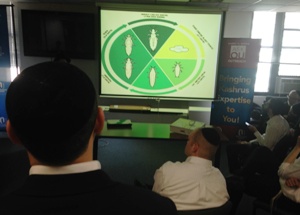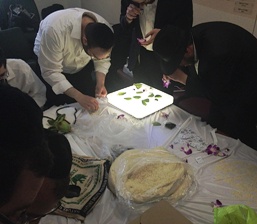On the opening day of ASK OU 12, Rabbi Avrohom Gordimer pondered the many ways of whey.

As the OU Kosher Rabbinic Coordinator in the dairy industry, and Chairman of the OU Dairy Committee, Rabbi Gordimer delved into the technical composition of milk before proceeding to a discussion of the relevant halachic sources applied to ancient and contemporary cheese and whey processing—highlighting the requirements that must be met, the areas that need special attention, and the halachic disputes pertaining to many dairy issues.
For the 70 bright rabbinical candidates, kollel members and mashgichim from across the United States and even Mexico, Rabbi Gordimer took the words of Torah law and gave them a face, bringing to life the words of our holy texts.
But Rabbi Gordimer wasn’t the anomaly of the day. He was only the beginning.
The world of OU Kosher was handed over to these gentleman from powerpoint and hands-on presentations by experts in the field to tours of OU certified restaurants, factories and facilities.
Advanced Seminars on Kashrus (ASK OU), funded by the Harry H. Beren Foundation of New Jersey, have been organized over the past 18 years, as the experts of OU Kosher open their doors and minds for an intensive kashrus education. Offered on alternating years (the other years are dedicated to advanced kashrus education for women), the ASK OU internship consists of two separate courses of study: A three-week intensive internship, and a one week training program, providing an overview of the field.

Rabbi Dovid Goldstein and Rabbi Lenny Steinberg.
“Both quantitatively and qualitatively it appears that Harry H. Beren ASK OU 12 was the largest and best program we have had in the 18 year history of ASK OU,” said Rabbi Yosef Grossman, OU Kosher senior rabbinic coordinator and director of kashrus education. “From the beginning, presenters told me that this group is the best we’ve ever had. Their tough questions were right on target and displayed much kashrus knowledge and experience. I’ll look forward to these individuals making an impact in the field of kashrus throughout the United States and around the globe.”
With a reputation for excellence, the ASK OU programs have more than 800 graduates from all over the globe, many of whom have gone on to take important positions in the kosher world. As in past years, many of the full time professionals are expected to work for large kosher certification agencies or for their local Vaad HaKashrus.
Learning the laws of bishul akum (food cooked by a person not required by the Torah to keep kosher) a few years ago, Lakewood yeshiva student Moshe Greif of Englewood, New Jersey was presented with a source book of OU Kosher policies on the subject. “As we explored the various questions poised and how the OU paskined (determined the ruling), we saw that the OU takes the application of the laws to a whole new level—it was fascinating,” he described. “Participating in ASK OU two years later, I came with more knowledge and more questions. It opened my eyes to what kosher certification is about at the core, and how the application of halacha is continuously evolving.”
Participants hailed from Minneapolis, Pittsburgh; Chicago; Silver Spring; Portland, OR; Fresno, CA; Cleveland; Philadelphia; Vallejo, CA; and Mexico City, Mexico. They came as well locally from Monsey/Spring Valley/Suffern, NY; Englewood and Lakewood, NJ; Williamsburg, Borough Park and Flatbush in Brooklyn; Queens and Far Rockaway; and Woodmere on Long Island.

Some grew up living and breathing OU Kosher as the sons of OU Kosher field representatives; others came with their own experiences since several of the interns have done hashgacha (kosher oversight) nationally and internationally. “All of them displayed a sharp knowledge of Yoreh Deah (one of the four sections of the Shulchan Aruch),” noted Rabbi Grossman.
Reflected Rabbi Gordimer, “Although every group of ASK OU interns is impressive in terms of its knowledge and interest in kashrus, this year’s group was quite exceptional. The group consisted of eager and serious young men who already possessed intimate knowledge of many of the halachic and technical aspects of the materials being presented, such that we were able to deliver far more information and bring the discussion to levels and realms which are normally only encountered by seasoned kashrus professionals. This made the ASK OU sessions especially enriching, and the program’s participants expressed their great and enthusiastic appreciation for including them in such high-level discussion.”
Shmuel Goldstein spent 17 years learning at the Yeshiva of Staten Island, from where he received smicha (rabbinic ordination), and gained advanced knowledge in shechita (laws pertaining to animal slaughter). A past participant of the ASK OU one-week course four years ago, he returned for the three week program to advance his knowledge and awareness as a mashgiach for a small kosher certification in southern New Jersey.
![Participants stand outside a Hampton Inn in Pennsylvania during a tour of nearby OU certified companies. The sign reads “Bruchim Haboim [Welcome] Orthodox Union Guests.”](http://www.ou.org/life/files/Hampton-Inn.jpg)
The sign reads “Bruchim Haboim [Welcome] Orthodox Union Guests.”
He added, “Each rabbinic coordinator appeared to me as a talmid chachum (deeply learned man of Jewish text). When it came to their specific field—be it wine, fish, birds, baked goods—their knowledge was massive. And each of the rabbinic coordinators, in turn, was humbled by the knowledge of the OU poskim.”
Reflecting on his overall impressions of ASK OU 12, Moshe Greif wrote, “It is well known that when Rav Avigdor Miller ztz’l ate an apple, he would take time to reflect on the many wonders of our Creator that were involved in bringing that apple to his table. After attending this insightful program, I have learned that there is sometimes much more to thank Hashem for. I now know some of what is involved in what goes on in kashrus before a product comes to me, and I thank Hashem for an organization like the OU who makes it all possible.”
The words of this author reflect his/her own opinions and do not necessarily represent the official position of the Orthodox Union.